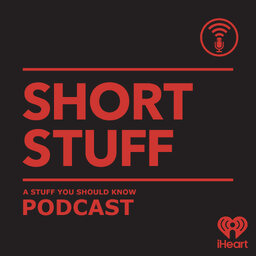Aspirin: The Wonder Drug
Humans have been using a form of aspirin for pain relief since at least the Sumerians. But in recent years we’ve come to learn the wonder drug is indeed awe-inspiring, from preventing heart attacks to possibly protecting humans from cancer.
Learn more about your ad-choices at https://www.iheartpodcastnetwork.com
In 1 playlist(s)
Stuff You Should Know
If you've ever wanted to know about champagne, satanism, the Stonewall Uprising, chaos theory, LSD, …Social links
Follow podcast
Recent clips

Selects: Operation Mincemeat: How A Corpse Fooled the Nazis
45:18

The Magnificent Golden Gate Bridge
50:53

Short Stuff: Magic 8 Ball
12:42
 Stuff You Should Know
Stuff You Should Know